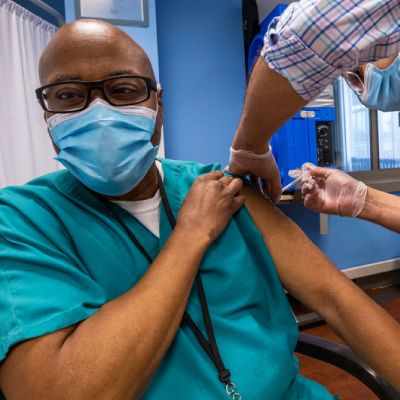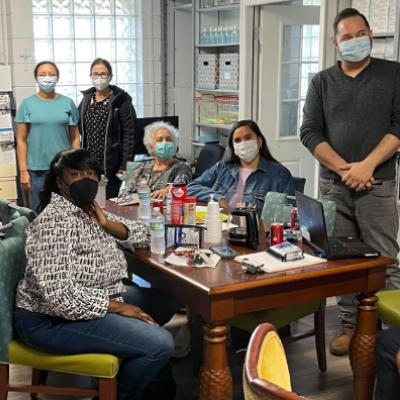- Who We Are
- Clinician Employment
- Publications
- Witness to Witness (W2W)
- El Premio Kugel & Zuroweste a la Justicia en la Salud
- Your Voice Matters: Photovoice Project
Wed, 01/26/2022 | by MCN Admin

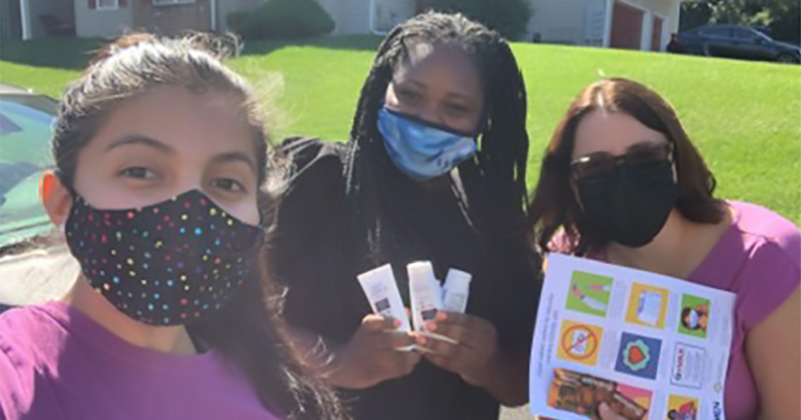
[Editor’s Note: Since July 2021, Alianza Nacional de Campesinas (Alianza), Migrant Clinicians Network (MCN), Rural Coalition and 20 organizational partners and members have mobilized 221 community health outreach workers across 20 states and Puerto Rico to encourage vaccination within Black, Indigenous, and people of color rural communities through a learning collaborative. Funded by an $8.1 million grant from the Health Resources and Services Administration (HRSA), the effort aims to raise vaccination rates among immigrant and migrant farmworkers and rural communities of color through reinforcing COVID-19 information, addressing vaccine hesitancy and accessibility, and assisting in countering misinformation and disinformation.]
“For migrant workers, there’s a lot of barriers to vaccine access in the United States,” Lucy Thames said at one of our weekly Learning Collaborative sessions. “A lot of farmworkers are getting vaccinated… but there are still structural issues in place.” Thames represents Centro de los Derechos del Migrante, Inc. (CDM), one of Migrant Clinicians Network’s long-time partners based in Maryland and Mexico. CDM is the first transnational migrant workers’ rights organization and has worked binationally with migrant populations aiding with labor and legal issues around migration for the last 15 years.
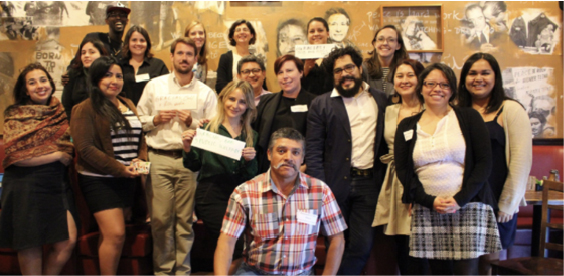
In the past year, CDM has refocused some of their efforts on vaccination and public health, redirecting some of their social media to fight against misinformation both in the United States and Mexico. CDM has used a website called Contratados as a platform for migrant workers to discuss employers, workplaces, and their experiences with them. Some social media accounts for Contratados have been utilized to run pandemic-related content – including Facebook Live events which allow workers to have their questions answered.
CDM also has hotlines set up to answer questions and to help people get information on how they can get vaccinated. The organization runs two separate hotlines, one based in the United States, and one based in Mexico, allowing CDM to get information to individuals in either country who may have questions about their health and COVID-19 vaccines.

Additionally, CDM has created a program known as Farmworker Community Health Outreach Corps (FCHOC) based in Maryland, where many part-time paid interns visit major community hubs to hand out important health information to members of the farmworker community on behalf of CDM. FCHOC is made up largely of young interns who are trained to serve as part-time community health workers. These interns are able to go out on weekends and evenings to communicate with farmworkers in times and places where they can talk about their personal health and safety. FCHOC has reached a total of 12 counties in Maryland, as well as in Delaware and Virginia.
As part of the outreach, FCHOC presents individuals in vulnerable communities with up-to-date and impactful information, making sure they can inform people on how to keep themselves safe and get vaccinated. FCHOC community health workers also leave resources created as part of this effort, including informational posters made by MCN, in high-traffic areas.
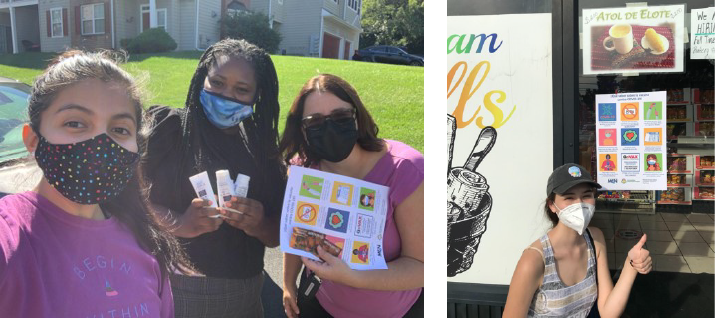
CDM’s strategies for communication and community education have allowed them to have a meaningful impact in multiple states and countries using relevant and up-to-date information and strategies to keep migrant workers safe. Thames explained that many of the migrant workers they communicate with are already vaccinated before leaving the United States. This work is vital not just to the health and safety of migrant workers within the United States, but also the health and safety of their other communities and the families and friends they have elsewhere.
Each week MCN facilitates a bilingual Learning Collaborative that offers partners access to clinical staff, other experts, an extensive library of fully editable COVID-19 resources, evidence-based COVID-19 updates, and extensive communications and marketing technical assistance to support partners’ use and adaptation of resources to fit their community’s needs. Each organization shares learning collaborative content and activities with their frontline community health workers, who tirelessly promote COVID-19 vaccination in the counties, towns, and neighborhoods where they live. This blog series highlights best and promising practices used by grant partners across the country, which are shared at the learning collaboratives, creating a diverse learning environment.
This is supported by the Health Services and Resources Administration (HRSA) of the U.S. Department of Health and Human Services (HHS) as part of an award totaling $8,105,547 with 0% percentage financed with non-governmental sources. The content are those of the author(s) and do not necessarily represent the official views of, nor an endorsement, by HRSA, or the U.S. Government. For more information, please visit HRSA.gov.
Got some good news to share? Contact us on our social media pages above.
Return to the main blog page or sign up for blog updates here.




